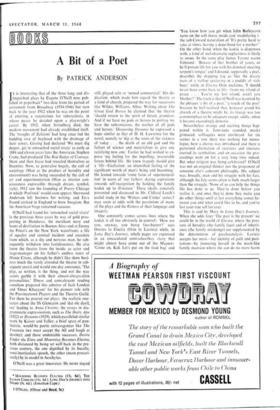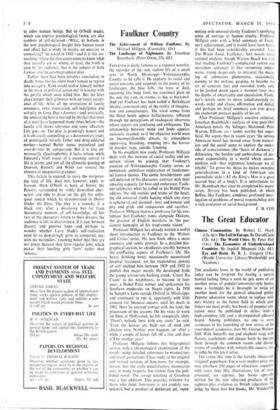A Bit of a Poet
By PATRICK ANDERSON
IT is interesting that of the three long and dis- tinguished plays by Eugene O'Neill now pub- lished in paperback* two date from his period of retirement from Broadway (1934-1946) but turn back to the year 1912 when he was on the point of entering a sanatorium for tuberculosis, in whose peace he decided upon a playwright's career. By 1912, when Strindberg died, the modern movement had already established itself. The 'troughs of Zolaism' had long since fed the budding rose of boyhood with the drainage of their sewer; Gissing had declared 'We must dig deeper, get to untouched social strata' as early as 1884 and eleven years later the American, Stephen Crane, had produced The Red Badge of Courage, Shaw and then Joyce had revealed themselves as Ibsenites. Now, to generalise hugely, the cult of sociology (Man as the product of heredity and environment) was being succeeded by the cult of art and experimentation (Man as interior con- sciousness expressible through dream, symbol, style). 1912 saw the founding of Poetry Chicago in which 'Prufrock' would soon appear; Sherwood Anderson left business for writing, and Ezra Pound arrived in England to brew Imagism. But the American Stage remained vacuous.
O'Neill had found his 'untouched social strata' in the previous three years by way of gold pros- pecting in Honduras, the merchant navy and bouts of destitution in Buenos Aires and at Jimmy the Priest's on the New York waterfront; a life of squalor and seminal incident and anecdote from which, as a shy and nervous man, he sub- sequently withdrew into fastidiousness. He also knew the theatre from the inside, as actor and stage-manager on his father's endless tours of Monte Cristo, although he didn't like show busi- ness much (he rarely attended the theatre in sub- sequent years) and would one day announce, `The play, as written, is the thing, and not the way actors garble it with their almost-always-alien personalities.' Illness and convalescent reading somehow prepared this admirer of Jack London and 'Omar Khayyam' for his pioneer role with the Provincetown Players and the Theatre Guild. For them he poured out plays: the realistic one- acters about the SS Glencairn and 'dal ole davil, sea' leading to Anna Christie; the essays in din,- grammatic expressionism, such as The Hairy Ape (1922) or Dynamo (1929), which paralleled similar work by Kaiser and Toiler; a brief spate of pan- theistic, would-be poetic extravaganzas like The Fountain (we must accept the All and laugh at destiny); and those undeniable successes, Desire Under the Elms and Mourning Becomes Electra, both distanced by being set well back in the pre- vious century, the one dignified by its bucolic, semi-inarticulate speech, the other (more precari- ously) by its model in Aeschylus.
O'Neill was a great innovator. He never stayed
• MOURNING BECOMES ELECTRA (13s. 6d.), THE ICEMAN COMETH (11s. 6c1.), LONG DAY'S JOURNEY INTO NIGHT (9s. 6d.). (Jonathan Cape.)
t O'NEni. (Oliver and Boyd, 5s.) still, played safe or 'turned commercial.' His de- dication, which made him regard the theatre as a kind of church, prepared the way for successors like Wilder, Williams, Albee. Writing about The Great God Brown he claimed that the theatre 'should return to the spirit of Greek grandeur. And if we have no gods or heroes to portray we have the subconscious, the mother of all gods and heroes.' Discussing Dynamo he expressed a hope similar to that of D. H. Lawrence for the novel, namely to 'dig at the roots of the sickness of today . . . the death of an old god and the failure of science and materialism to give any satisfying new one.' Earlier he had wished to ex- press 'my feeling for the impelling, inscrutable forces behind life.' He knew tragedy should give a lift—Exaltation; an intensified feeling of the significant worth of man's being and becoming.' He leaned towards 'some form of supernatural- ism' in scorn of 'our fathers' daring aspirations towards self-recognition by holding the family kodak up to ill-nature.' These ideals, concisely presented and discussed in Mr. Clifford Leech's useful study in the 'Writers and Critics' series,t may seem at odds with the pessimism of many of the plays and the flatness of their language and imagery.
One constantly comes across lines where the kodak is all too obviously in control: 'How are you, anyway, you bossy fuss-buzzer!' says Orestes to Electra (Orin to Lavinia) while, in Long Day's Journey, whole pages are expressed in an emasculated semi-schoolboy slang that might almost have come out of the Magnet: 'Come on, Kid. Let's put on the feed bag' and 'You know how you get when John Barleycorn turns on the soft music inside you' modulating tt the sub-.Coward naturalism of 'It's pretty hard to take at times, having a dope-fiend for a mother!' On the other hand, when the kodak is dispensed with, a kind of melodramatic explicitness is likely to ensue. In the same play James Tyrone warns Edmund : 'Beware of that brother of yours, or he'll poison life for you with his damned sneering serpent's tongue' and Edmund, supposedly a poet, describes the dripping fog as 'like the dreary tears of a trollop spattering in a puddle of stale beer,' while in Electra Orin exclaims, 'I should never have come back to life—from my island of peace . . You're my lost island, aren't you Mother?' The truth is that O'Neill was haunted by the phrases 'a bit of a poet,' a touch of the poet' because he half-realised that, however grand his church of a theatre might be, its liturgy was too commonplace to be adequate except, oddly, when it became exceedingly demotic.
Nevertheless strange and exciting things hap- pened within it. Tom-toms sounded, masks grimaced, soliloquies were overheard for six scenes in a row there was nothing but mono- logue, here a chorus was introduced and there a patterned alternation of exteriors and interiors exerted its symbolism, and on occasion the pro- ceedings went on for a very long time indeed. But what religion was being celebrated? O'Neill was not an original thinker nor the proponent of someone else's coherent philosophy. His subject was, broadly, man and his struggle with his fate, although the fate seems often to bulk much larger than the struggle. 'None of us can help the things life has done to us. They're done before you realise it, and once they're done they make you do other things until at last everything comes be- tween you and what you'd like to be, and you've lost your true self for ever.'
This is said by Mary in Long Day's Journey. When she adds later 'The past is the present' we could be in the world of Electra, where the pres- sure of heredity (the family face) and of inherit- ance (the family misdoings) are supplemented by the determinism of psychoanalysis. Lavinia' accepts her mask—her identity of guilt and puri- tanism—by immuring herself in the mask-like family mansion where she can do no more harm
to other human beings. But to O'Neill masks, which can express psychological facets, are also symbols of self-delusion—'What, at bottom, is the new psychological insight into human cause and effect but a study in masks, an exercise in unmasking?' he asked in 1932—and it is this un- masking, where the characters come to know what they nakedly are or where, at least, the truth is seen by the audience, that is the subject of both Iceman and the autobiographical play.
Earlier there had been parables concluding in death: Jones lost his white man's veneer to regress into savagery, Yank could realise himself neither in the mask of political action nor in kinship with the gorilla which soon killed him. But the later plays temper their grimness with an ironic accept- ance of life. After all the revelations of family meanness, envy, frustration, self-indulgence and self-pity in Long Day's Journey—and artistically the unmasking here is marred by the fact that most of it must have happened many times before—the family still shows tolerance and some affection. Life goes on. The play is grindingly honest and it is obviously compelling as a documentary study of grotesquely miserly father and drug-addicted mother—Samuel Butler seems prejudiced and over-devious by comparison. But it is also un- necessarily claustrophobic; it lacks action; while Edmund's brief vision of a meaning central to life is jejune, and not all the climactic quoting of Dowson, Rossetti and Wilde can conceal the absence of imaginative grandeur.
This failure to expand, to carry the invigorat- ing tang of life, does not, however, apply to Iceman. Here O'Neill is back at Jimmy the Priest's, surrounded by richly diversified char- acters and able to draw on the gift for collo- quial speech which he demonstrated in Desire Under the Elms. The play is a comedy, if a black one; after a desolating but far from therapeutic moment of self-knowledge, all but two of the characters return to their dreams; the audience is left to discriminate, if it can, between illusory and genuine hope—and perhaps to wonder whether Larry Slade's self-realisation need be so despairingly grim as compared, say, with the bartenders' touching belief that they are not pimps because they have regular jobs, which makes their hustling girls `tarts' rather than 'whores.'







































 Previous page
Previous page